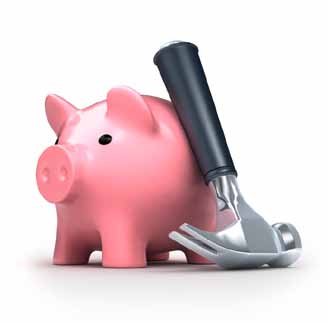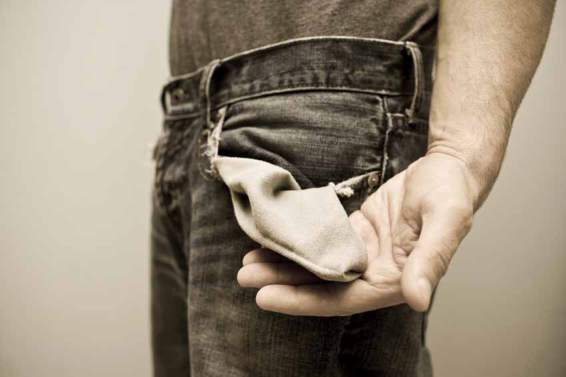Chapter 13
Chapter 13 is a repayment plan for individuals with regular income. It provides a mechanism for individuals to prevent foreclosures and repossessions, while catching up on their secured debts.
Repayment of unsecured creditors in Chapter 13 can range from 0% to 100% depending on the debtor’s income and the make up of the debt.
However even Chapter 13 filers only ‘pay out’ from their salary. That is to say, they pay a monthly fee to the Trustee, but hold on to all the rest of their property. This is true for 99 out of 100 cases. It is a very exceptional person who has so much property that they exceed the exemption limits and have to surrender any of it; even then, the Trustee is more likely to ask for a cash equivalent rather than seize and auction it.
Another federal law that affects bankruptcy is the Bankruptcy Abuse Prevention and Consumer Protection Act. It was developed and pushed for by lobbyists for the credit card industry and written by Phil Gramm, the ‘genius behind’ the sub-prime mortgage debacle.
3

Bankruptcy Abuse Prevention and Consumer Protection Act
Despite its name, BAPCPA does not protect consumers. In fact, this legislation makes it harder for the average consumer to file bankruptcy and it also punishes attorneys who represent them.
The philosophy behind it is that only deadbeats file bankruptcy and that only shyster lawyers represent people who file bankruptcy.
This is insulting to the honest bankruptcy attorneys who want to help their clients navigate the complexities of bankruptcy so that they may take advantage of their rights under the law. But it is an even bigger slap in the face to all the honest people who have always paid their bills, but find themselves in need of debt relief due to circumstances beyond their control.
4
How Good People End Up with Bad Debt
The roads that lead to bankruptcy are as unique as the individuals who travel along them. For some, poor money management skills are the problem. For others, buying into the American philosophy of
‘buy now, pay later’ has caused them to live beyond their means. It’s a shame really.
For the vast majority however, illness, job loss, death, divorce, or even ‘acts of God’ -- such as Hurricane Katrina and the oil spill in the Gulf of Mexico –suddenly and dramatically affect a person’s income and finances. Most recently, national economic problems and poor governance have thrown the lives of millions of Americans into financial chaos.
When money is tight, people turn to their credit cards to help tide them over until they get on their feet again. They charge groceries so they can feed their families. Or charge utility bills to keep the lights on. When credit card balances begin to climb, they use one credit card to pay off another. Or they make take out a second mortgage or home equity loan to pay off their unsecured debit.
They do it in ‘good faith.’ Most people who incur debt do so with every intention of repaying it.
Unfortunately, for most people, credit is a short-term solution. In the long term, credit purchases and loans saddle people with a mountain of fees that result in even more debt consumers can’t pay off.
(Is this what happened to you?)
YOU Are Not the Guilty Party
While BAPCPA makes it appear that consumers are the problem, it’s really the credit card companies and mortgage companies that are the real architects of the financial crisis that many consumers find themselves in. It is in the best interest of these businesses to keep you paying and paying and paying.
That’s where their profits come from.
Lenders have recently come under attack for the deceptive practices they use to lure people into incurring debts that they cannot afford...and then punish their customers for missed payments with things like late fees, overdraft fees, and increasing interest rates. It’s literally a vicious cycle and one that is virtually impossible for the consumer to escape.
Bankruptcy is the antidote to the toxic environment created by these predatory lenders.
Congratulations! You’ve just completed the first step. You now have an understanding of what bankruptcy is and the different kinds of bankruptcy. You’ve also learned that many good people accrue bad debt and find themselves unable to meet their financial obligations. And you’ve discovered that credit card companies and mortgage brokers, take advantage of people’s short-term financial needs with unsavory lending practices that make things go from bad to worse.
Now that you understand what bankruptcy is, it’s time to move on to Step 2: the advantages of bankruptcy and whether or not it is a good solution for you.
5
Step Two – Understand the Benefits of Filing
When you wipe your debt completely clean through bankruptcy, it is called discharge of debt. The goal of this is to help reduce your overall debt and allow you to start again with a clean slate.
As such, the bankruptcy option is, in many ways, integral to American life and American commerce.
Without bankruptcy, fewer of us would be able to take the risks necessary to build new businesses or better our lives.
6 Ways Bankruptcy Improves Your Life
If you are overwhelmed with debt you can no longer pay, bankruptcy might be a viable option for you.
And while it is true that filing for bankruptcy will have an impact on your credit, this important legal action solves more problems than it creates.
Gives You Peace of Mind
When your finances are in turmoil, you are constantly on edge, wondering how to solve your problems.
Bankruptcy puts an end to that worry because bankruptcy is a plan.
Stops Creditor Harassment
Today with automated ‘robo-calls,’ creditors and collection agencies can harass you dozens of times a day or night, whether it’s dinner time, your kids bed time, or 6 a.m. on the weekend. When you file for bankruptcy, the harassing phone calls stop...completely and immediately.
As soon as a creditor is notified that you have filed for bankruptcy, they are prevented from continuing any of their collection efforts, including telephone calls, letters, lawsuits, garnishments, foreclosure, and repossession.
Lets YOU Prioritize Your Debts, Not Your Creditors
The advantage of filing for bankruptcy is that it protects your property. You see, in a bankruptcy, your secured creditors get paid first. If there’s nothing left after they’re paid, your unsecured creditors are out of luck and the debt is simply erased.
Secured debts are generally big-ticket items you own such as cars and homes where you made an initial financial investment upfront and then agree to a payment plan. If you fail to keep up with your payments, then the bank or lender can repossess the item you purchased Unsecured debts usually refer to money owed on credit cards and personal loans. Medical bills are also considered an unsecured debt since you did not have to put up an item as collateral in order to obtain the debt.
The advantages to filing for bankruptcy are obvious. What may not be as obvious is whether or not you should file. The next section will help make that decision.
6
The Bankruptcy Self-Assessment Quiz
There is no specific formula or list of criteria for determining whether or not bankruptcy is a good option for you. That’s why most bankruptcy attorneys, including Moran Law, offer free consultations on the subject.
Still, there are some common indicators that you can use as a litmus test for bankruptcy.
General Questions about Your Finances
Are you living paycheck to paycheck with no ‘wiggle room’?
Do you write checks even when you know there is no money in your account to cover them?
Do you frequently have to pay overdraft charges
Do you regularly pay your bills late?
Do you have to juggle utility, telephone, and cable bills and payments to keep creditors off your back?
Do you currently have a title loan or a payday loan?
Have you had to dip into savings or retirement accounts to pay bills?
Lifestyle Questions
Are creditors calling you repeatedly?
Are your receiving notices and threatening letters from collection agencies?
Have you had to ask friends or family to help you out with loans to pay your bills?
Have you been denied credit, insurance, employment, or a security clearance because of poor credit?
Questions About Your Credit Card
Do you use more than 3 credit cards?
Are they maxed out or close to it?
Do you pay late or overdraft fees on all or most of your cards?
Do you use credit cards to pay for necessities such as food, medication, or gas?
Do you make only the minimum payment on your credit cards each month?
Questions About Your Home
Are you one month or more behind in your mortgage payments?
Are you in pre-foreclosure?
Questions About Your Car
Are you one month (or more) behind on your car payment?
Is your auto finance company threatening to repossess your car?
Have you recently had a vehicle repossessed?
7

Step 3 – Understand the Penalties of Doing Nothing
An important part of achieving financial freedom is to face your problems head on instead of burying your head in the sand. So if you answered “yes” to any of these questions, it’s time to stop procrastinating and to do something about your situation.
It doesn’t matter if you know for certain that you’re underwater or fear that if you don’t do something soon that your debt problems will spiral out of control. If you have any doubt whatsoever that you will be able to keep up with your financial obligations, it’s time to turn to an established bankruptcy attorney for guidance and assistance.
An honest bankruptcy attorney will evaluate your unique situation and advise you if it’s in your best interest to file for bankruptcy or whether you’d be better off taking another route.
You see, bankruptcy is not the only option available to people who are in financial peril. So your third step, and what we’ll talk about in this chapter, is understanding the consequences of not filing for bankruptcy, whether that means doing nothing at all (a mistake) or seeking out the services of a debt counseling agency (another mistake).
The recession has left a lot of good people so financially shell-shocked that they are completely paralyzed. But ignoring your financial problems won’t make them go away. They’re like an infection.
If nothing is done to stop them, financial problems can spread until they kill you financially.
If you ignore your creditors and simply do nothing, things are going to get worse...much worse...fast.
Collection Agencies
If you missed several payments, and fail to communicate with your credit card company or other lender about your situation, they will turn your account over to a collection agency. Collection agencies are even more aggressive than lenders themselves when it comes to getting your money. Their representatives will make threatening phone calls and send threatening notices to you in the mail.
To add insult to injury, collection agencies charge a fee...and that fee gets passed on to you and is included in the debt figure that you owe.
Collection agencies cannot go into your bank account and take your money. They cannot garnish your wages. But don’t be fooled into thinking that you can ignore them, too. Collection agencies have a fall-back.
8
Lawsuits
When a collection agency is unable to get a consumer to make debt payments, a lawsuit is the next step. The suit will either be filed by the collection agency or by the bank that issued you the credit card. This is a worst case scenario because it is very difficult to win this type of lawsuit.
The ‘proof’ against you is the merchandise listed on your bill.
Lawsuits are expensive. And if you lose yours, you’ll be required to pay your original debt in its entirety plus any associated penalties and fees (including those of the collection agency), plus your attorney’s fees and costs...as well as the attorney’s fees of the creditor.
It gets worse: if you can’t pay all at once, you’ll be put on a payment plan. If you fall behind in your payments, the judgment creditor will often begin to garnish your wages. All the while, interest will continue to accrue until your account is paid in full. But bankruptcy stops all this from happening.
Foreclosure and Repossession
Now if you lose the lawsuit (as is likely) or if you fail to appear in court when summoned, a judgment will be entered against you. This judgment will become a matter of public record, as do most court decisions. That means that anyone who looks into your background will find it.
Once this happens, the creditor can garnish your paycheck or bank account. Moreover, the creditor can have the sheriff in your county levy on other property that you own and sell it to pay off or pay down the judgment. This includes your home (which will go into foreclosure) and your automobile (which will be repossessed).
It’s Better to Act Immediately, If Only to Get Advice
People who are deeply in debt are at risk for losing their families, their jobs, their homes, and -- if depression sets in – they are at risk for losing their lives. According to the Pennsylvania Adult Suicide Coalition “Mounting debt (can) be linked to a wide variety of negative health outcomes. Such stressors may lead to thoughts of suicide or even to attempts and completions.”
Once you come to know that you are facing a financial trouble, you should act immediately. The longer you wait, the deeper and deeper you are getting into debt. As you learned previously, lenders will charge you over-the-limit fees and raise your interest rates. If you’re overdrawn in your checking account, you’ll pay insufficient funds fees to your bank and you’ll probably also have to pay another fee to the company that took your ‘bad check.’
First, you have to decide what action you should take to control the situation. You’ll need to choose between bankruptcy and one of the options that you’ll read about below. For many people, the enormity of the decision they need to make keeps them stuck in place.
One worry is that the decision will backfire, leaving them worse off then when they began. Others are simply afraid. Many people are simply too embarrassed by their situation to want to admit it out loud.
But really, the biggest obstacle is that people don’t have the adequate information they need to understand bankruptcy and its alternatives. So they’re afraid to act because they are not fully aware of the possible impact that filing for bankruptcy will have on them.
This is where a bankruptcy professional comes in. When you work with a competent and qualified bankruptcy attorney, you don’t have to make this decision alone.
9

Step 4 – Evaluate the Alternatives
Deciding to file bankruptcy can be a tough decision. Almost everyone confronting the decision goes back and forth with ‘fight or flight’ impulses, wondering if they should struggle to pay their debts or get relief from the constant pressure through bankruptcy and start over.
There is no easy way to get out of debt. Bankruptcy is one solution and there are alternatives as well.
But if financial problems are an infection, some of the ‘cures’ are worse than the disease.
As I wrote previously, there are lots of unlicensed, unqualified so-called authorities on financial problems out there. So if you’re even thinking about using a debt counseling service or taking out a debt consolidation loan, you must take the time to investigate the company before signing an agreement with them. You want to be sure that nothing that is done supposedly on your behalf will leave you off in a worse situation than when you started. (Some attempts to avoid bankruptcy might have a negative impact if you latter decide to file bankruptcy.) The main alternatives for avoiding bankruptcy are:
Out-of-court settlement with creditors
Debt counseling services
Debt consolidation loans
Let’s talk a little about each one.
Out of Court Settlement
It may surprise you to learn that you, yourself, can negotiate with your creditors to reduce debts, eliminate fees and penalties, and give you other ‘relief’ from your financial problems. If you can afford to settle an account by paying a lump sum (as opposed to a payment plan), you’ll have more negotiating leverage.
But there’s a problem with this approach. The person you’re negotiating with is a trained professional when it comes to debt collections. They have many tactics and techniques at their disposal, such as using complex legal terminology in order to confuse or intimidate you. They use your lack of knowledge or hesitation to stand up for your rights as a way to get the upper hand.
In an effort to avoid being taken advantage of by creditors and collection agencies, many consumers seek the assistance of debt counseling services.
10
Debt Counseling Services
Debt counseling services deal with creditors on your behalf to reduce interest rates, adjust monthly payment minimums, and sometimes even lower the balances that are due. Then they ‘consolidate’ all of your debts. You make a single monthly payment to the debt counseling service and they, in turn, pay your creditors.
It’s common for debt counseling services to sell their client accounts to other companies. This is the same kind of ‘bundling’ of debt that led to the financial failure on Wall Street. The problem is that the new company -- either intentionally or due to bad record-keeping -- fails to make the payments to their clients’ creditors or they make those payments late.
When that happens, creditors place the account in a default status and once again begin attempting to collect the debt. And the money you paid to the debt consolidation service is lost.
Debt Consolidation Loans
People who are optimistic and/or can demonstrate that their financial situation is about to change often opt to get a loan to tide them over. One option is a debt consolidation loan. You find a lender that will give you enough money to pay off all your other loans and then you make one payment to the new lender. This is similar to what a debt consolidation service does.
One downside to a debt consolidation loan is that you may be subject to heavy pre-payment penalties.
In other words, if you come into a sum of money before the debt consolidation loan is due, and you attempt to pay off more than you owe, your extra payments may be subjected to heavy surcharges or fees. This doesn’t mean that you can’t pay off your debt consolidation loan early -- just that doing so may prove costly. The debt consolidation loan companies build in these prepayment penalties not to punish borrowers but to ensure that they profit according to an easily worked out scheme.
Unfortunately, people who get debt consolidation loans don’t always use the money to pay off their existing debts. They only pay off part of what they owe and in a very short time find their credit maxed out again, only now they have the additional weight of the consolidation loan on their shoulders.
Payday Loans
A payday loan (also called a paycheck advance or payday advance) is a small, short-term loan that is intended to cover a borrower’s expenses until his or her next payday. But what sounds like a quick, easy solution to financial problems comes at a high cost.
Generally, payday loans must be paid in a short period of time; they come due within 14 to 30 days.
If you’re not truly certain that you will have the money at that time, this is not a realistic option.
Furthermore, payday loans can carry interest rates of 15% or more. This may not sound like very much, but the annual percentage rate calculates to almost 1200%!
11

Auto Title Loans
Auto title loans, like payday loans, make quick money available for a short time at high interest. The loans carry interest rates as high as 500% percent and usually mature in 30 days. Unlike payday loans, auto title loans frequently offer rollover option that allow a borrower to extend the term of the loan for another thirty days.
This extension is what gets most people in trouble. After the first 30 days, all payments are applied to the interest first and the interest continues to accumulate day after day after day...at that 500% rate...
until you are able to pay the loan in full.
If 60 days go by and you are still unable to repay the loan, the lender can legally repossess you car and sell it to recover the amount of the loan along with any outstanding interest and fees that may be due.
And you know what’s really crazy? In some states, if the repossessed vehicle is sold for more than what is owed on the loan, the lender is not required to turn the excess revenue over to the borrower.
12
Step 5 – Sort Out Fact from Fiction
Sadly, there has been a willful attempt to convince consumers that they no longer have the right to file for bankruptcy...and if they do, that they will lose everything they own. The architect of this mis-information campaign is the powerful credit card lobby (the people behind the mis-named Bankruptcy Abuse Prevention and Consumer Protection Act)...aided and abetted by a mainstream media which circulates the story.
So before you decide whether or not to file, it’s important to be able to separate fact from fiction...
•Fact #1 – BAPCPA Legislation Has Effectively ‘Halted’ Bankruptcy Filings Although the BAPCPA has changed the methods by which people qualify to file bankruptcy, and its intended goal was to make it much more difficult for people to file, in most cases, people are able to get the same or better relief under the new laws as they were before the legislation was enacted.
•Fact #2 – Filing for Bankruptcy Is Not Confusing and Hard to Do A large piece of mis-information that circulates regarding bankruptcy is that filing is difficult.
It isn’t...because bankruptcy does not have to be a do-it-yourself endeavor. There is assuredly a lot of paperwork involved, but the skilled and experienced bankruptcy attorney you choose to represent you will make the process much less stressful and complicated.
Good News!
It is now mandatory that all filings must be done electronically, so that makes the entire process much easier.
•Fact #3 – Filing Will Not Make You a Credit ‘Untouchable’ for 10 Years While it is true that bankruptcy will appear on your credit report for 7-10 years, it does not mean that you will become a credit pariah whom no lender will work with for a decade. If you work to re-build your credit immediately after you file and keep your record ‘clean,’ you can repair bad credit in a little over a year.
You have options! The easiest way to re-build your credit standing is with a secured credit card that you use regularly and pay promptly. To obtain a secured card, you give the lender a cash deposit (collateral) that becomes the credit line for your account. For example, if you put $500 in the account; you can charge up to $500. You may be able to add to the deposit to add more credit, or sometimes a bank will reward you for good payment history and add to your credit line without additional deposits.
Warning!
Beware of secured credit cards (and unsecured cards) that take advantage of consumers with bad finances by charging high annual fees and exorbitant interest rates. You should also avoid secured cards that do not convert to an unsecured card after eighteen months of on-time payments.
Another alternative for re-building credit is to get an installment loan or personal loan. One good thing about many installment loans is that they have a set payment, due at a specified time, and the total amount of the loan gradually decreases (there are many lenders who offer this type of loan).
And if you have a student loan that was not paid in full during your bankruptcy, continue making your payments after your bankruptcy case is discharged. This is another great way to reestablish your good credit standing.
13
Note
Payday loans are a type of installment loan, but as you learned in Step 4, these loans come with extremely high interest rates, usually at minimum 30%. Be cautious about payment loans, but installment loans, in general, are a normal lending practice and are nothing to be feared.
•Fact #4 - You WILL Be Able to Own Property Again
One of the greatest fears that paralyze people facing bankruptcy is the dread that they will never be able to own a home or car again. This fear is completely unfounded. If you work to re-build your credit by staying on top of your finances, you will usually be in a position to purchase a car or home within 18-24 months after your bankruptcy has been discharged.
The truth is that you will begin to receive credit card offers and even offers from auto finance companies almost as soon as your bankruptcy is discharged. In some instances, you may even be able to get certain loans while you are in bankruptcy.
Keep in mind that bankruptcy wipes out debt, which in turn helps improve your credit score. And making timely payments on the property that you choose to keep also helps raise your credit score.
•Fact #5 – You Will NOT Lose Everything You Own
Contrary to what most people believe, bankruptcy makes it possible for you to keep the majority of your property, and it offers you protection from the collection efforts of your creditors, protections you simply don’t have outside of bankruptcy.
The laws pertaining to property exemptions for debtors vary from state to state. Therefore, you should consult an attorney in your area to properly advise you of the laws in your jurisdiction.
Note
Bankruptcy doesn’t always wipe out liens. This means that you will have to continue to pay for certain property if you want to keep it. You can discuss this with your attorney
•Fact #6 – Bankruptcy Is ‘Public Record,’ Not ‘Public Knowledge’
Another tremendous fear many people have is that when the file for bankruptcy, everyone will know about it. The shame and embarrassment of this situation keeps many people stuck. The truth, however, is that while your attorney, his/her staff, and court personnel will be aware of your situation, no one else will know unless you tell them. You see, while bankruptcy filings are a matter of ‘public record’ and anyone can ferret out the information if they wish to do so, bankruptcy filings are not published in newspapers or circulated in any way.
Go











